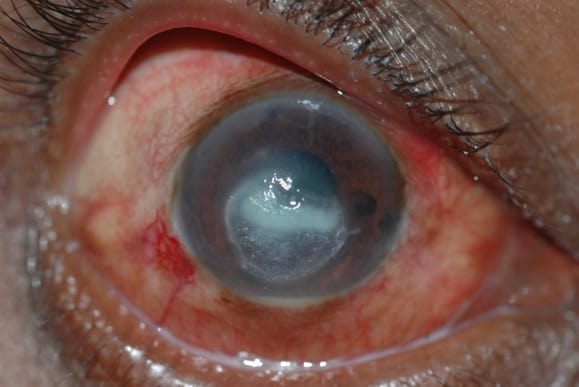Fungal keratitis – a severe infection of the cornea – affects an estimated 1.1 to 1.4 million eyes annually, advise researchers from the UK, the Republic of Congo, Nigeria, India, and the USA.

Researchers have just published a review in the Journal of Fungi, stressing the importance of recognising fungal keratitis as an NTD. Recognition facilitates diagnosis and treatment, to prevent the surgical removal of 95,000 to 115,000 eyes annually – predominantly in tropical and subtropical locations.
Fungal keratitis aligns with the NTDs identified by the WHO, disproportionately affecting impoverished areas, and causing health and economic consequences. Research estimates that the annual incidence range is from 73/100,000 in South Asia and 13.5/100,000 humans in Africa – contrasting with 0.02/100,000 cases in Europe.
Patient Jason David Cooper, treated for fungal keratitis says “in lots of ways, I’ve been very lucky. The [fungal keratitis] I had – I think you actually can be quite lucky to [have] your eye at the end of it.” Jason was diagnosed and treated in London.
Guidelines for the diagnosis and management of fungal keratitis are incomplete and scarce. Delayed diagnosis and treatment can cause irreversible corneal destruction, increasing the risk of unemployment, poverty, disability and depression – disproportionately affecting women in rural areas.
Diagnosis requires taking a minute sample from the cornea, direct microscopy, and fungal culture. Over 300 different airborne fungi have been implicated.
Treatment response is slow, usually responding over several weeks. Early treatment works better. Although 60% of severe cases are effectively managed with correct intensive anti-fungal eye drops, studies reveal detrimental outcomes with incorrect treatment – often resulting in worse blindness and requiring surgical intervention.
Inappropriate steroid eye drops, ineffective antibacterial therapy, and no or delayed diagnosis, all contribute to bilateral or unilateral blindness.
As an ocular health emergency, the WHO is urged to recognise fungal keratitis as an NTD. Recognition by the WHO can facilitate greater awareness of the condition, broader access to research, resources, and ultimately improve diagnostic capability and medical access.
Featured paper: